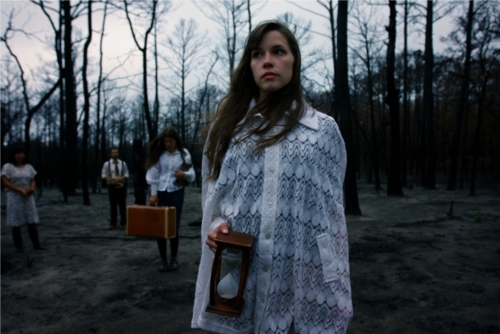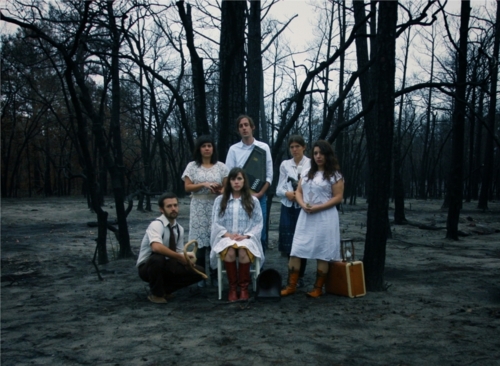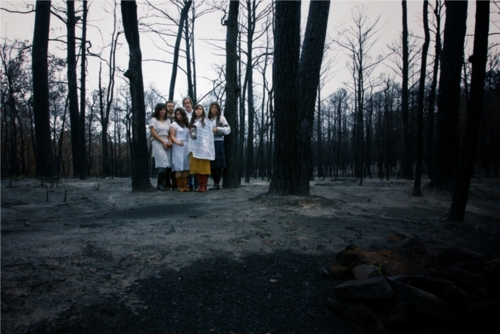
Interview with Dana Falconberry
Originally from Michigan, Dana Falconberry went to a small college in Arkansas and then blindly moved to Austin about seven years ago with the hopes of thriving in a dynamic music scene. After playing open mics and coffee houses for several months, Falconberry met Redding Hunter and joined Peter and the Wolf. She enjoyed her first show in Austin with her own fleshed-out band in August 2010; now she is gearing up to celebrate the release of her band’s first EP — Though I Didn’t Call It Came — with Marmalakes and Sleep Good on January 12th at The Mohawk in Austin. The EP serves a prelude to a full-length release recorded during the same session, which will hopefully be released later in 2012.
There are few things in this world that are more beautiful than a lusciously orchestrated Dana Falconberry song. Considering the obvious influence that the complexities of nature have on Falconberry’s songs, it seemed quite fitting for us to chat with her during a leisurely stroll around the University of Texas campus on an unseasonably warm and sunny January day…
A2: How has living in Austin affected you as a musician?
DF: There is so much here to support musicians — such as Health Alliance for Austin Musicians (HAAM) and SIMS Foundation — that makes living here possible. It is such a supportive community. We have so many band friends. It’s really encouraging and inspirational. You can plan amazing shows together and there are venues for these shows. It is a great set up for making music. The bands who we are playing with for our EP release show — Marmalakes and Sleep Good — don’t sound very much like us…but I don’t know who we would sound like? I love that. In Austin, you can curate this weird kind of show with all of these people who are good friends but the bands who are on the bill sound very different from each other. I think that works well here.

A2: How has Austin’s natural landscape affected you as a musician?
DF: Austin has some really remote parks in the middle of the city. I used to walk over to the Shoal Creek trail by Lamar — you suddenly feel like you are in the middle of the woods and completely secluded. You can completely lose yourself in the environment yet still be in Austin. There are tons of places like that. I find a lot of solace and inspiration in that kind of environment.
A2: What inspires you lyrically?
DF: I find a lot of similarities between little phenomena in nature and the human experience. That is inspiring or helpful in some way. If I feel stuck on a problem, I can look at the way something in nature figures it out and that is usually a good solution for me. I am completely floored by natural phenomena. Nature is completely universal and timeless, which I think is important in songwriting. It seems to fit every situation, and every time and place in the world too.
A2: Are there subjects that you feel more comfortable addressing lyrically than others?
DF: I used to write about heartbreak and melodramatic stuff, but I find now that I am more interested in complex ideas and feelings–like subtle and complicated emotions, rather than large sweeping melodramatic feelings. I’m not telling stories; it is pretty abstract. A lot of times I am speaking autobiographically, but I don’t think you can listen to my lyrics and know what happened. Telling a literal, straightforward story about my own life is pretty boring. I am not like a tortured, drug-addicted musician who has crazy stories, you know? It is more interesting for me to discuss things more abstractly.
A2: How do you approach the orchestration of your songs?
DF: The songwriting, I always do by myself with just a guitar. Now that I have been playing with this band for over a year and I trust them, I am excited about what they can add to what I am writing. I will now leave parts, like, “I don’t know what is going to happen here but someone is going to do something cool.” I play the songs a few times in rehearsals and they noodle around. Usually they come up with really awesome parts that blow my mind from the get go, and then we talk about what my original ideas were for the song and meld the two together.

My good friend and bandmate Christopher Cox co-produced the EP (and the upcoming record) with me and Grant Johnson; Christopher is a brilliant musician and he arranged all of the string parts for the recordings. He sent me samples and mock-ups to approve; I also recorded a bunch of demos, sketches of what I thought the songs would look like. I am getting way more into having bigger arrangements. I really didn’t know these things were possible, and now more and more seems to become possible. I’ve been playing with my bass player for years now and I just realized that she is totally awesome on the cello too…so now I am incorporating that. There is a constant level of changing things up.
A2: And the vocal harmonies?
DF: I write my melody first. Then, I have a rehearsal just with Gina Dvorak and Karla Manzur and we figure out the vocal parts. I usually come to them with something like “in this verse I want it to be really busy and I want all of these things going on and I want it to sound like” — and I give them some really weird abstract term. Then, we come up with something that works for the three of us.
